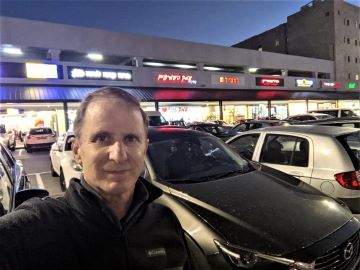Israel is the front-runner in the global race for jabs. Its success story is a mixture of a competitive government move and efficient local management. Teva Pharmaceutical Industries has been the company responsible for the rollout of Covid-19 vaccines in Israel. It is the world’s largest generic drug manufacturer and the largest provider of healthcare products and services in the Israeli market. Placed in the middle of the small country, it has the capacity to store and hold the BionNTech – Pfizer vaccine developed in Mainz/Germany at a temperature of -70 C°. Their cars can leave in the morning and be at any point in Israel at a maximum of 4 hours. And there are forthcoming important elections….. While Europe remains slow, Israel’s public life starts again and the pandemic is expected to be soon under control. GLO Fellow Gil S. Epstein of Bar-Ilan University shares some background information and insights in the interview provided below.
Cars are back & the lights are on

Some core messages of the interview below:
- Israel is a small country with very efficient medical organizations that can execute the vaccinations fast all over the country.
- The older population has seen the large benefits of vaccinations, and there was an effective and strong public campaign introducing the mission.
- There is a lot of pressure to open stores and go back to work.
- The groups left to be vaccinated are the young assuming a low risk of mortality and those fearing negative side effects.
- A green passport for all with a second vaccination was established. This enables going to concerts and shopping; going to work might be limited to those with such a document.
- The role of scientists is crucial.
- Incentives play a very important role.

GLO Fellow Gil S. Epstein is a Professor of Economics and Dean of Social Science at Bar-Ilan University, GLO Country Lead Israel, and an Associate Editor of the Journal of Population Economics. He was already vaccinated against COVID-19 twice some time ago and carries a green passport. His fields of interest are labor economics, migration and political economy.

Interview
GLO: Why is Israel now by far the global front-runner in the vaccination race?
Gil S. Epstein: The main reason seems to be twofold: Obtaining a large number of vaccines and efficient distribution. Israel is a relatively small country with just over a population of nine million people. Israel obtained a large number of vaccinations in a short period of time. Israel signed a contract with Pfizer to provide them with data regarding the vaccinated population and this seems to be the reason why we were able to obtain so many vaccinations and so fast. Israel is a small country with very efficient medical organizations that can execute the vaccinations fast all over the country. Pfizer couldn’t ask for better conditions to test their vaccination. This gave them the incentive to provide Israel with the number of vaccinations needed.
GLO: What explains the initial dramatic speed of the vaccine campaign, luck or special Israeli factors?
Gil S. Epstein: The first vaccinations were given to the elderly. Those in the high-risk groups. Those that know that the probability of catching the virus with a high mortality rate is high. Elderly people that want to meet their kids and grand-kids want to be vaccinated. They understood that even if there are long run risks from taking the vaccination, the expected quality of life will increase by being vaccinated. Add to this a strong public campaign where the Prime Minister, the President and many other important people had their vaccination live on TV. The media talked about the benefits, and how this will change the life of those getting vaccinated.
GLO: It seems that the corona crisis is over: Shops are opening, strategy or just caused by pressure from the public?
Gil S. Epstein: The crisis is not over. There is a lot of pressure to open stores and go back to work. The data show that those who have received two vaccinations have a very low probability of becoming sick. We have had three lockdowns and small businesses are not doing well. The government issued a green passport for all those who have had two vaccinations. Most of the shops and businesses will, by law, only serve those that have the green passport and this decreases the probability of being sick and increases the incentive to get vaccinated. This week we had for the first time in a long-time live shows and concerts for those having the green passport with a limited number of attendants. In addition, the upcoming elections (in one-month) provide incentives to move forward.
GLO: Israel has seen a drop in immunization rates since making the vaccine available to everyone recently. Who are the anti-vaxxers and will this endanger reaching herd immunity soon?
Gil S. Epstein: We have seen a drop in the immunization rate. The reason for this is that those in the high risk group have been vaccinated, and the groups left is the younger population that do not see themselves at high risk of mortality. The side effects of the vaccine are not yet clear and there are those thinking it may affect fertility or create other health issues, and those issues discourage them from getting vaccinated.
In response, the medical institutes seeing that the public is not willing to be vaccinated decided to go to the public. For example, over the weekends when they saw that many people are vacationing in the parks, they went to the parks and offered to vaccinate those that hadn’t been vaccinated. The idea was to decrease the inconvenience of going to get vaccinated. This seems helping to increase the rate.
If we will not be able to increase the rate of vaccination, this may well decrease the chances of reaching herd immunity.
GLO: Israel has introduced a coronavirus vaccination certificate: A model for the world?
Gil S. Epstein: Israel has introduced a green passport for all those where at least one week has passed since the second vaccination. This will enable them to go to concerts, shopping and there are even talks about limiting the right to work to only those who have the green passport. This creates a strong incentive for people to get vaccinated. The idea is twofold: To create a safe environment for vaccinated people and to provide an incentive to get vaccinated. This seems to work quite well.
GLO: What role have scientists played in the success?
Gil S. Epstein: The role of scientists is very important. Both by passing the information to the public and by helping the decision makers to make the right decisions.
GLO: What are major scientific insights so far we can learn about?
Gil S. Epstein: Incentives play a very important role. Scientists have an important and major part in the decision making. Economics, biology, chemistry, etc., all have a strong impact in getting us out of this crisis. This crisis has brought scientists to the stage.
*************
With Gil S. Epstein spoke Klaus F. Zimmermann, GLO President.
Ends;

